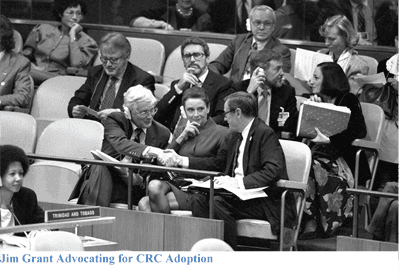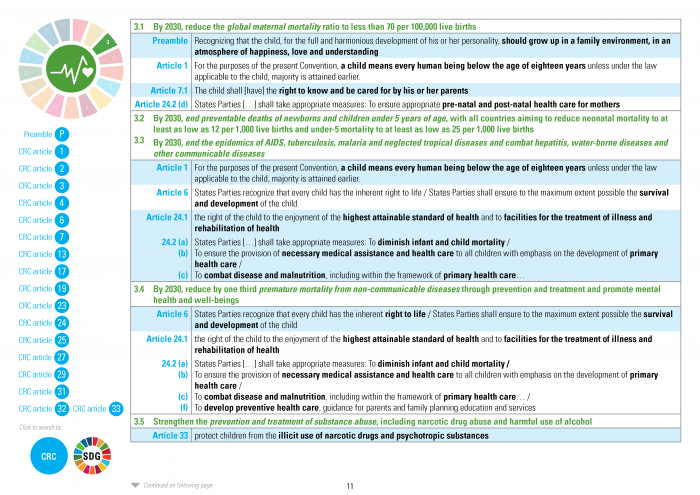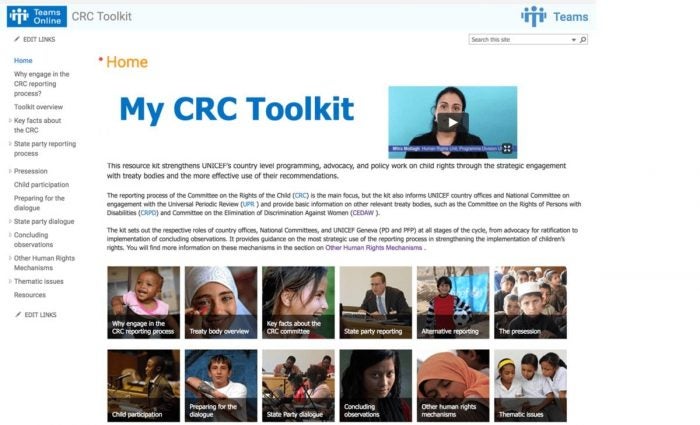This article was written by Benjamin Mason Meier, Associate Professor of Global Health Policy at the University of North Carolina at Chapel Hill, Mitra Motlagh, the Head of UNICEF’s Human Rights Unit, & Kumanan Rasanathan, the former Senior Adviser in UNICEF’s Health Section.
The longstanding efforts of the United Nations Children’s Fund (UNICEF) to implement human rights were revitalized by the 1989 Convention on the Rights of the Child (CRC), which recognized “the right of the child to the enjoyment of the highest attainable standard of health and to facilities for the treatment of illness and rehabilitation of health.” Realizing the child’s right to health through global health governance has required UNICEF to implement human rights across its health programming, assistance to states, and work with the Committee on the Rights of the Child.
I. Child Health Becomes Central to Global Development
Where the Allied Nations sought to address the horrors faced by the children of Europe during World War II, the United Nations (UN) General Assembly voted unanimously in December 1946 to create the United Nations International Children’s Emergency Fund as a basis to continue providing necessary aid to the children affected by war. Thereafter expanding its focus to address determinants of child health throughout the world, UNICEF’s unique role as a global advocate for children allowed it to operate cooperatively on both sides of the Cold War, with UNICEF leaders recognizing this political strength in protecting children’s basic needs as fundamental to global development. From this foundation in disease prevention for economic development, these evolving efforts secured UNICEF a central role in global health governance. UNICEF partnered with the World Health Organization (WHO) to organize the 1978 Alma-Ata Conference on Primary Health Care, through which UNICEF came to focus comprehensively on determinants of child health through national health systems. These health policy efforts positioned UNICEF to respond to the public health impacts of neoliberal economic policy, adapting the primary health care approach to drive resources toward its proclaimed “Child Survival Revolution.” Championed by UNICEF Executive Director Jim Grant, this focus on child survival would seek to address the “basic needs” underlying the majority of infant deaths. Advocating for people-centered development that would empower the most marginalized, UNICEF created an opening to employ a rights-based approach to development as a foundation to realize human rights for child health.
II. The Convention on the Rights of the Child Provides UNICEF’s Human Rights Foundation
The rights of the child have long been a focus of the global community, with the wartime suffering of children garnering international interest following both the First and Second World War. With the League of Nations adopting the 1924 Declaration of Geneva as a framework for child development policy, the plight of children would again be brought into stark relief following the Great Depression and World War II, giving rise to the 1959 UN Declaration on the Rights of the Child. Holding that “the best interests of the child shall be the paramount consideration,” this UN Declaration enumerated ten principles to secure a child’s need for “special safeguards and care.” Yet, child rights remained neglected in the subsequent development of international human rights treaties. While UNICEF expressed strong rhetorical support for child rights in its programmatic initiatives, it did not prioritize these rights under international law, believing that implementing international law would draw it into conflicts with states over treaty violations.

In a dramatic shift, however, UNICEF came to be an active leader in the final efforts to develop the CRC – supporting its unanimous adoption by the UN General Assembly in November 1989, working with states to assure its rapid ratification, and leading it to become the most universally ratified human rights treaty.
The CRC requires that the “best interests of the child” be addressed holistically, recognizing a specific right to the “enjoyment of the highest attainable standard of health” through both health care services and public health systems. Calling for “international assistance and cooperation” in realizing the rights of the child, states would specifically authorize UNICEF to support implementation of the CRC, providing technical assistance to both national governments and the new UN Committee on the Rights of the Child.
The CRC would become central to UNICEF’s mission, providing a legal foundation for UNICEF’s organization-wide approach to human rights. Shifting UNICEF from a needs-based to a rights-based approach, the organization would analyze its own implementation responsibilities under the CRC, revising its mission statement to mandate that the organization “advocate for the protection of children’s rights” and strive “to establish children’s rights as enduring ethical principles and international standards of behaviour towards children.” Where many UNICEF staff already saw themselves operating under a rights-based approach, this new organizational mission legitimized explicit reference to human rights law in UNICEF policies and rights-based assistance to states parties in implementing the CRC. As the UN moved in 1997 to “mainstream” human rights across all its programs and activities, UNICEF had developed a basis under the CRC to make this rights-based approach a programmatic reality for the health and wellbeing of children.
III. Advancing Child Health and Human Rights through UNICEF Policies, Programs & Practices
UNICEF has supported the implementation of human rights for child health through its health programming, technical assistance to national governments, and work with the Committee on the Rights of the Child.
In its health programming, the CRC has framed the interrelated rights that structure child health, with UNICEF programs implementing a human rights-based approach through:
(a) programmatic consideration of universality, equity, and accountability,
(b) meaningful child participation in health policymaking, and
(c) expansive focus across determinants of health.
UNICEF has sought to operationalize rights in practice by addressing equity as a basis for child health, prioritizing the “worst off children” through cost-effective health programming. While the health program has made comparatively less use of the rights-based approach in its programming, focusing instead on the pragmatic delivery of health services, human rights have been crucial in other programs to address underlying determinants of health. As a basis to encourage rights realization under the Sustainable Development Goals (SDGs), UNICEF has mapped the relationship between SDG targets and CRC obligations, highlighting where SDG targets support the child’s right to health.

Links between SDG Targets and CRC Obligations
Building capacity for UNICEF’s rights-based programming under the SDGs, UNICEF’s Human Rights Unit has developed a “short-course” to explain the rights of the child and rights-based approach, providing a UNICEF-specific training and an online network to complement the “Human Rights Up Front” course developed by the Office of the High Commissioner for Human Rights.
Human rights have thus become instrumental to UNICEF’s technical health assistance to states, with human rights employed to set the goals of programming, structure the process of engagement, and evaluate the outcomes of country planning. UNICEF country offices have employed CRC obligations in planning with states (as duty-bearers), engagement with affected communities (as rights-holder), and reporting to the Committee on the Rights of the Child (as a basis for rights-based accountability). Developing a country programme every five years based upon a Situation Analysis, UNICEF’s approach to examining the interconnected human rights that underlie health has allowed country offices to expand their engagement beyond the health sector, working with government ministries, national human rights institutions, and civil society to frame multisectoral approaches to child health. UNICEF’s Human Rights Unit has supported these country office functions through the development of a “child rights toolkit”; the creation of core courses, continuing education, and online webinars on the rights-based approach to health; and the establishment of a Human Rights Network to connect regional human rights focal points and address gaps in country office capacity.
UNICEF’s Human Rights Unit has also worked systematically to advance children’s health through the Committee on the Rights of the Child, assisting the Committee in both developing general comments and monitoring states parties. In the context of health, the Committee’s General Comment 15 elucidated state obligations under the CRC to realize the child’s right to health through a focus on underlying determinants of health. Monitoring state implementation of these child health obligations, UNICEF country offices have participated consistently with the Committee, assisting in the development of state reports, the submission of independent information, and the process of constructive dialogue. In supporting this country office engagement, UNICEF’s Geneva-based focal point developed an online “monitoring toolkit,” examining the step-by-step engagement with treaty bodies, providing practical information for UNICEF country offices, and highlighting illustrative case studies on national human rights implementation.

Committee on the Rights of the Child Monitoring Toolkit
As a result of this active UNICEF country office engagement, the Committee has long focused on health obligations under the CRC, consulting with UNICEF in reviewing state reports on the health of the child and adopting concluding observations that can then frame UNICEF’s rights-based health assistance.
Conclusion
Repeatedly reaffirming the CRC as a basis for child health and wellbeing, UNICEF has found support to frame the health-related human rights of the child through:
Country Offices – As UNICEF country officers have long been key champions for the implementation of human rights in UNICEF programming, country offices have employed their autonomy to champion human rights implementation in their work with national ministries – incorporating CRC obligations and the Committee’s concluding observations in each country’s five-year plan.
State Support – UNICEF has a privileged position in addressing human rights because of near-universal state support for child rights obligations under the CRC, giving UNICEF political legitimacy to influence national policy through child rights discourse and child rights advocates.
The Committee on the Rights of the Child – The consistent and sustained UNICEF-Committee partnership is an unparalleled agency-treaty body relationship, and this mutually-beneficial relationship allows the Committee to rely on UNICEF for its technical advice on child health and UNICEF to rely on the Committee for its human rights authority with states.
Driven by its history and galvanized by the CRC, UNICEF holds a unique position among global health agencies in its commitment and capacity to implement health-related human rights for children throughout the world.
Read more about UNICEF’s efforts to mainstream human rights for child health in:
Human Rights in Global Health: Rights-Based Governance for a Globalizing World (2018)
available from Oxford University Press or Amazon.com



